


1390 Another plague outbreak occurs in Europe (next 1400). In Jan. Scottish Stewart king #1 (since 1371) Robert II (b. 1316) makes a farewell tour of NE Scotland to show support for the actions of his son Robert Stewart, earl of Fife in reining-in his other son Alexander Stewart, then dies in Dundonald Castle in Ayrshire on Apr. 19, and on Aug. 14 after a 4-mo. delay, during which Alexander destroys Elgin Cathedral, his eldest son John Stewart of Kyle, earl of Carrick is crowned Robert III (1337-1406) of Scotland at Scone (until Apr. 4, 1406), changing his name to avoid any assoc. with the unpopular John de Baliol or John II of France; meanwhile Robert II's mistake in giving too much power to his sons after working like hell to get it for them ends up in them joining the pro-David II crowd in painting the old man as a poor king?; "I cannot hold this aged king... to have been a skilful warrior or wise in counsel" (John Mair, 1521). On Oct. 9 king (since May 29, 1379) Juan I of Castile (b. 1358) dies after a fall from a horse, and his son Henry III (the Sufferer) (the Mourner) (the Infirm) (1379-1406) becomes Trastamara king of Castile and Leon #3 (until Dec. 25, 1406), going on to trim the power of the aristocracy, repealing the alcabala sales tax, and ending their right to attend the royal council; after a crescendo of violence against the Jews next year, he passes laws protecting them. On July 1 the Mahdian (Barbary) Crusade sees 6K French and Genoese Crusaders on 60 ships siege Mahdia, Tunisia, held by 40K men under Abu al-Abbas Ahmad for 10 weeks until a relief army arrives in Oct. and a trade treaty is negotiated. Queen Margreta get her grandnephew Erik of Pomerania (b. 1382) elected as heir to the Swedish throne. Aragonese troops led by Infante Marin, brother of John I of Aragon defeat and expel Count John III of Armagnac from Majorca; meanwhile John I loses the duchies of Athens and Neopatras in Greece. Gian Galeazzo Visconti (1351-1402) of Milan begins a campaign to take Tuscany (ends 1392). In his decade the Kingdom of Kongo in WC Africa is founded, growing to incl. the territory from the Atlantic Ocean E to the Kwango River, and from the Congo River S to the Kwanza River; the kings of Kongo are called the Manikongo; in 1891 it becomes a vassal state of Portugal, and in 1914 it is abolished and incorporated into the Portuguese colony of Angola. A census of the Jews in Castile shows only 3.6K family heads remaining; the archdeacon of Ecija assumes control of the diocese after the death of the archbishop of Seville, and orders the destruction of all synagogues and Hebrew books; chief rabbi of Castile Solomon Halevi (Pablo de Santa Maria) and his entire family allegedly convert to Roman Catholicism. John Wycliffe's writings reach Bohemia - oh, 25 miles from home, girl, my feet are hurting mighty bad? In the late 14th cent. hopped beer begins to be imported to England from the Netherlands; too bad, English ale drinkers resist its bitter taste until its greater shelf life (months instead of days), smaller amount of grain required, and marketability cause it to win drinkers over, dominating London brewing by the 17th cent. Architecture: Sir William Drummond builds Balmoral Estate in Aberdeenshire, Scotland after buying the land from Robert II. Nonfiction: In this decade Thomas Walsingham of St. Albans (-1422) writes Chronicle, a Latin history of England. Poetry: Pearl Poet (anon.), Sir Gawain and the Green Knight; by the anon. Pearl (Gawain) Poet (John Massey?); about King Arthur's nephew, who is challenged to a beheading game by the mysterious Green Knight, and is tested by Lady Bertilak. Anon., Pearl; Patience; Cleanness. Births: Flemish painter (Northern Renaissance leader) Jan van Eyck (Johannes de Eyck) (d. 1441); brother of Hubert van Eyck (1366-1426). English prince Humphrey of Gloucester (d. 1447) on Oct. 3; 4th son of Henry IV and 1st wife Mary de Bohun; named after maternal grandfather Humphrey de Bohun, 7th earl of Hereford (1342-73); created duke in 1414. French poet Alain Chartier (d. 1430) in Bayeux, Normandy. Scottish gen. Archibald Douglas (d. 1439); son of Archibald Douglas, 4th earl of Douglas and Margaret Stewart, eldest daughter of Robert III. French officer La Hire (Fr. "Herisson" = hedgehog) (Etienne de Vignolles) (d. 1443) AKA "Hire-God" (Lat. "Ire Dei" = wrath of God) in Prehacq-les-Bains, Landes; friend of Joan of Arc. Wallachian prince (1436-42, 1443-7) Vlad II Dracul ("the Dragon") (d. 1447); son of Mircea I (1386-1418); father of Mircea II (1427-47), Vlad III Dracula the Impaler (1431-76), and Radu the Handsome (1437-75). Portuguese military hero Alvaro Vaz de Almada, 1st Count of Avranches (d. 1449); knighted on Aug. 4, 1444 by Henry VI of England. Spanish (Galician) poet Juan Rodriguez de la Camara (del Padron) (d. 1450) in Padron; last poet of the Galician School. English clergyman William Byngham (Bingham) (d. 1451). English composer-mathematician John Dunstable (Dunstaple) (d. 1453) in Dunstable, Bedfordshire; leading English composer of the early 15th cent.; first composer to write instrumental accompaniments to church music, and to write elaborate music about a cantus firmus; forgotten until the end of the 19th cent., when German church musicologist Franz Xaver Haberl discovers his work in Trento Cathedral in Italy. Portuguese explorer Joao Goncalves Zarco (d. 1471). Deaths: Scottish (1371-90) king Robert II (b. 1316) on Apr. 19 in Dundonald Castle in Ayrshire; buried in Scone Abbey beside Queen Euphemia. Spanish king of Castile (1379-90) Juan (John) I (b. 1358) on Oct. 9 in Alcala de Henares (fall from a horse); same fate as his cousin John I of Aragon (1350-96).
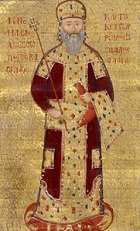
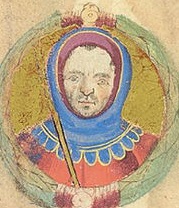
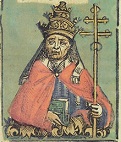

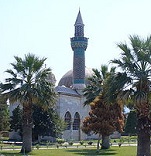
1391 On Feb. 16 Byzantine emperor (since 1341) John V Palaeologus (b. 1332) dies, and the Byzantines lose their last possession in Asia Minor to the Turks; his grandson John VII Palaeologus seizes power for a short time; meanwhile on Feb. 16 John V Palaeologus's son Manuel II Palaeologus (Manuel II Palaiologos) (1350-1425) becomes Byzantine emperor (until July 21, 1425); trouble is, he's a hostage of Ottoman Sultan Beyazid (Bajazet) I?; in the winter he writes Dialogue Held with a Certain Persian, the Worthy Mouterizes, in Ankara of Galatia, on Christianity vs. Islam, containing the immortal soundbyte: "Show me just what Muhammad brought that was new, and there you will find things only evil and inhuman, such as his command to spread by the sword the faith he preached", which is quoted by Pope Benedict XVI on Sept. 12, 2006; it concludes "God is not pleased by blood, and not acting reasonably is contrary to God's nature. Faith is born of the soul, not the body. Whoever would lead someone to faith needs the ability to speak well and to reason properly, without violence and threats. To convince a reasonable soul, one does not need a strong arm, or weapons of any kind, or any other means of threatening a person with death", to which the Muslim replies that God isn't bound even by his own word, and that nothing can make him reveal the truth to us, and that he could even make us practise idolatry if he wants. On Mar. 4 the U. of Ferrara in Ferrara, Emilia-Romagna, Italy is founded by Marquis Alberto V D'Este (1347-93) with permission from Pope Boniface X; on Oct. 18 the Studium Generale opens, offering courses in law and theology; in 1871 after Italian unification it becomes a free univ., teaching law, mathematics, medicine, and veterinary medicine (until 1876); in 1946 after WWII it becomes state-supported, growing from 500 students in 1914 to 16K students. On June 6 (Tammuz 1) taking advantage of the death of weak king John (Juan) I last Oct. 9, who barely held Jew-hatred back, and the appointment of a weak regent council, a huge Jewish pogrom begins in Seville, Spain, killing 4K Jews out of 7K families, followed by Cordoba, Toledo, Majorca, Barcelona, and Valencia, causing many Jews to fake conversion to Roman Catholicism, beginning the phenomenon of mass Crypto-Judaism, which later backfires as nobody but their hairdressers know for sure? On June 18 Tamerlane wins the Battle of Kanduzcha in India. On Oct. 7 St. Birgitta (1303-73) (Nor. "splendid") is canonized by Pope Boniface IX, becoming Sweden's first saint - a Viking saint? On Nov. 11 a group of four pissed-off Franciscans demand an audience with the qadi at the al-Aqsa Mosque in Jerusalem, and tell him that Muhammad was "a libertine, a murderer, a glutton, a despoiler who thought that the purpose of human life was eating, whoring, and wearing expensive clothes", refusing conversion to Islam before being executed and joyfully becoming martyrs for Christ, enduring beating and torture before being hacked into pieces by a mad mob and and burned. Bosnian king (since 1353) Tvrtko I dies, and his sons Stjepan (Stephen) Tvrtko II (-1443) and Stjepan Ostoja fight for the succession, causing the kingdom to begin to disintegrate. Amadeus VII dies, and his son Amadeus VIII the Peaceful (1383-1451) becomes count of Savoy, scheming to turn it into a duchy. Leopold IV (1371-1411), 2nd son of Leopold III is made ruler of Further Austria by his older brother Duke William the Ambitious, followed by Tirol in 1396 (until 1411). The Ottomans under Yigit Bey capture Skopje in Macedonia, and annex the Janarid principality in Kastmonu; Wallachia is forced to pay tribute. A revolt in Sicily proclaims Louis of Durazzo (1324-62) (vicar of Albania since 1337) as king, and John I of Aragon quashes it. Architecture: The Green (Yesil) Mosque of Iznik in Iznik, Turkey (begun 1378) is completed, with a cool green prayer tower. Births: Portuguese Aviz king #11 (1433-8) Duarte (Edward) (the Philosopher) (the Eloquent) (d. 1438) on Oct. 31 in Tomar; son of John I (1357-1433) and Philippa of Lancaster (1360-1415) (daughter of John of Gaunt); brother of Prince Pedro (1392-1449) and Henry the Navigator (1394-1460). English heir (last of the Mortimer line) Edmund de Mortimer, 5th Earl of March, 7th Earl of Ulster (d. 1425); son of Roger Mortimer, 4th earl of March; nephew of Harry Hotspur's wife; grandnephew of Richard II. Scottish leader Archibald, 5th Earl of Douglas (d. 1439). Greek Orthodox hesychast theologian (St.) Mark of Ephesus (Manuel Eugenicus) (Eugenikos) (d. 1444 in Constantinople; feast day: Jan. 19. Italian architect-sculptor Michelozzo di Bartolommeo Michelozzi (d. 1472) in Florence; pupil of Ghiberti.
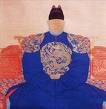




1392 In Aug. en route to Brittany with his army, French king (since 1380) Charles VI the Beloved (1368-1422) goes mad and kills four knights in the forest of Le Mans, and almost kills his brother Louis of Orleans, going on to become more and more mad, leading to his brothers stripping him of political power, which results in a power struggle between Louis of Orleans and John the Fearless, duke of Burgundy that makes it ripe for takeover by the English. On Oct. 21 S Japanese Yamato emperor Go-Kameyama finally turns over the three sacred treasures to N emperor Go-Komatsu, making him sole Japanese Yamato emperor #100 of Japan (until 1412), and ending the Ashikaga Revolt (begun 1331). Muhammad VII (1370-1408) becomes Nasrid sultan #12 of Granada (until 1408); Yussuf ben-Serragh, head of the Abencerrages (Arab. "saddler's son") tribe helps him restore his crown 3x; when one of them is caught climing up to the window of a lady of the royal family, the whole Abencerrages family is shut up in the Alhambra in the Hall of the Abencerrages before being murdered. Yi Songgye, with the aid of the Ming rulers of China seizes the Korean throne from the Korean Koryo (Goryeo) Dynasty, making Keijo (modern-day Seoul) their capital; on Aug. 5 Taejo (1335-1408) (Ni Seong-gye) (Ni Dani) becomes king of Korea (until Oct. 14, 1398); the Wang Dynasty ends, and the Yi (Choson) (Chosen) (Joseon) Dynasty begins (ends 1910); the Annals of the Choson Dynasty, detailing everyday court life begin to be compiled (until 1863), becoming the longest continuous historical record on Earth (until ?). Charles VI of France (1368-1422) suffers the first of his 44 bouts of madness (fever and convulsions), causing him to tear his clothing and break furniture, and get the idea that he is made of glass and about to break; in a flash of lucidity he prohibits the playing of chess before going completely insane, causing brothers Philip the Bold, Duke of Burgundy (1342-1404) and Jean of Valois, Duke of Berry (1340-1416) to be appointed regent and resume control while vying for power with Charles VI's dissolute brother Louis, whom he makes Louis, Duke of Orleans (Orléans) (1372-1407), and his own son John the Fearless (1371-1419). Byzantine emperor Manuel II Palaeologus escapes from the court of Beyazid I, causing him to seige Constantinople for almost 10 years (1394-1402). Florence blocks Milan's advance on Tuscany, aided by the rebellion of Padua. Witowt is recognized as master of Lithuania by Ladislaus II of Poland. The Malwa Sultanate is founded in Malwa in WC India (until 1562), wich capital in Mandu. After recognizing the rot that has set in, the Russian Orthodox Church stops all mention of the existence of a Roman emperor - it's survival in the city when you're living day by day? The Ashikagas becomes shoguns of Muromachi. Foreigners in England are forbidden to retail goods. A law in Venice orders horses and mules to carry bells while crossing the bridges, and prohibits horses in the crowded Merceria. Births: Italian duke of Milan #2 (1412-47) Filippo (Philippo) Maria Visconti (d. 1447) on Sept. 23 in Milan; son of Gian Galeazzo Visconti (1351-1402). Byzantine emperor (1425-48) John VIII Palaeologus (Palaiologos) (d. 1448) on Dec. 18; eldest son of Manuel II and Helena Dragas (daughter of Prince Constantine Dragas). Burmese Hanthawaddy king #10 (1421-4) Binnya Dhammaraza (d. 1424) in Pegu; son of Razadarit (1368-1421); brother of Binnya Ran I (1395-1446). Portuguese Aviz infante prince ("of the Seven Parts of the World") Pedro (Peter), Duke of Coimbra (das Sete Partidas do Mundo) (of the Seven Parts of the World) (d. 1449); son of Joao I (1357-1433) and Philippa of Lancaster (1360-1415) (daughter of John of Gaunt); brother of Edward I (1391-1438) and prince Henry the Navigator (1394-1460). Deaths: Russian Orthodox monk St. Sergius of Radonezh (b. 1314) on Sept. 25 in Trinity Lavra of St. Sergius. English court favorite (of Richard II) Robert de Vere, earl of Oxford (b. 1362) in Louvain, France (exile); killed by a wild boar; Richard II has the body brought back to England, and opens the coffin and kisses his hand. Bosnian duke (1388-92) Vlatko Vukovic Kosaca (b. ?); buried in Boljuni near Stolac.




1393 On Mar. 20 German king (since June 10, 1376) and Bohemian king (since Nov. 29, 1378) Wenceslaus (Wenceslas) (Wenzel) IV (the Drunkard) (the Lazy) of Luxembourg (1361-1419) has Prague vicar-gen. (St.) John of Nepomuk (b. 1345) tortured then murdered in Prague by being thrown over the Charles Bridge into the Moldau River for backing the Roman pope against the Avignon pope and confirming a candidate for abbot of Kladrau without the king's permission - snakes, why did it have to be snakes? On July 17 after a 3-mo. siege, taking advantage of the absence of tsar (since Feb. 17, 1371) Ivan Shishman (1350-95), who is holed-up in Nikopol, and helped by treason, the city of Veliko Tarnovo (Trnovo) (Tarnovgrad) (City of the Tsars), capital of Bulgaria falls to the Ottomans, who go on to annex most of the vassal state of Bulgaria by 1396, and retain control for the next 515 years (until 1908), although Christian pockets in the mountains hold out; the Ottomans begin the conquest of Albania (ends 1395) - the original Big Gulp, of Slavic and Turkish Christians? After knocking off the Alberti family, Maso degli Albizzi (1382-1417) comes to power in Florence as gonfaloniere. Robert III makes his teenie son David Stewart, Duke of Rothesay (1378-1402) the new earl of Carrick as a step towards succession, and gets his wannabe brother Earl Robert of Fife discontinued as lt. of Scotland, though he remains chamberlain in control of finances, presiding over a drastic devaluation of Scottish money; meanwhile Robert III allies with the Red Douglases in Angus (SE Scotland), while Fife allies with the Black Douglases (whose emblem is the red heart), who about this time build Threave Castle on an island in the River Dee; Fife and David, along with Earl Lindsay of Crawford begin more campaigns against pesky Alexander Stewart and his sons in the highlands (until 1399). The English Parliament passes the Statute of Praemunire, continuing the freeing process begun in 1279 by the Statute of Mortmain by restricting the judicial authority of the Church. Richard II passes a law requiring inns to display a sign, causing England to grow more colorful. New College in Oxford, founded by Winchester bishop William of Wykeham (1320-1404) opens. John I of Aragon founds the Consistori de la Gaya Sciencia de Barcelona (Academy of the Gay Science of Barcelona), a lit. academy imitating the Consistori del Gay Saber of Toulouse (founded 1323). Nonfiction: Anon., Le Menagier (Ménagier) de Paris; guidebook for married women in running a household, incl. sex, cooking, and gardening, written by an elderly husband for his younger wife. Births: Persian Mongol Timurid sultan (1447-9) and astronomer-mathematician (Sunni Muslim) Ulugh Beg ("Great Ruler") (Mirza Mohammad Taregh bin Shahrokh) (d. 1449) in Sultaniyeh, Persia; grandson of Tamerlane (1336-1405); turns Samarkand into a center of science and learning. Deaths: Bohemian priest St. John of Nepomuk (b. 1345) on Mar. 20 in Prague (thrown over the Charles Bridge into the Moldau River); canonized on Mar. 19, 1719. Italian lord of Ferrara and Modena (1388-93) Alberto V d'Este, marquis of Ferrara (b. 1347) on July 30. Japanese Ashikaga pretender emperor #5 (1371-82) Go-En'yu (b. 1359) on June 6.


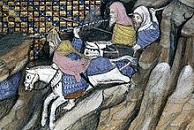

1394 On Sept. 16 Antipope (since 1378) Clement VII (b. 1342) dies of mushroom poisoning, and on Sept. 28 cardinal (since 1375) Pedro de Luna of the diocese of Tortosa in Aragon is elected antipope #2 of the Great Schism Antipope Benedict XIII (1328-1423) (until 1417) by the cardinals in Avignon on his promise of supporting the ending of the schism, which he reneges on. A 4-year English-French Truce in their Hundred Years' War of Fun and Delight is signed in Calais. On Oct. 2 after formidable Leinster king (since 1375) Art Óg Mac Murchadha Caomhánach (Art MacMurrough-Kavanagh) (Art M'Morrough O'Cavanagh) (Art MacMorrough) (Art MacMorrow-Kavanagh) (Art MacMorrow) (1357-1417) erodes the authority of the young earl of Ulster, English king Richard II invades Ireland (until May 1395) with 7K men to enforce his rule (first expedition to Ireland since King John in 1210), accompanied by Thomas Woodstock, duke of Gloucester; Edmund of Langley, duke of York acts as regent in his absence; too bad, the Battle of Ros-Mhic-Thriuin (Thriúin) near New Ross in County Wexford is a V for Macmurrough; on Dec. 25 Richard II defines the borders of English rule in Ireland AKA the English Pale. The Battle of Egea sees the Granadans become the first troops in Iberia to use handguns? King Wenceslaus IV is taken prisoner by his cousin Jobst of Moravia. The Ottomans under Sultan Bayezid I conquer Thessaly, and begin the First Ottoman Siege of Constantinople (ends 1402), blockading it to starve it out, causing it to be devastated by famine and plague, and a large part of the pop. to flee. Abd al-Aziz II (-1434) becomes emir of the Hafsid Dynasty in Tunisia (until 1434), pirating Christian shipping and using the profits for bldgs., art and culture, drawing retaliatory strikes against Tunisian cities by Aragon and Venice. Jaunpur and Awadh in India become independent under the Sharki (Sharqi) Dynasty (ends 1479), founded by eunuch Malik Sarvar (Khwaja Jahan) (-1402), who adopts sons of black African descent. A free-roaming pig is tried like a person and hanged in Normandy for eating a child - shanks for nothing? Winchester (St. Mary's) College at Oxford, founded by William of Wykeham opens on Mar. 28 - let's sit back and get lost in a word of Alice? Architecture: William Wynford begins remodelling the Norman nave of Winchester Cathedral in the new Perpendicular Gothic style. Nonfiction: Trouvere Jean d'Arras of N France writes The Noble History of the Lusignans, dedicated to Marie of Valois, duchess of Bar, which incl. Roman (Chronique) de Melusine, about Crusader King Elynas of Albany (Alba or Scotland) and his daughter Melusine by fairy Pressyne, who is condemned to be a mermaid - I wish I could be like Superman Births: Portuguese Aviz prince (father of the caravel) Henry the Navigator (the Seafarer), Duke of Viseu (d. 1460) on Mar. 4 in Porto; 5th child of John I and Philippa of Lancaster (daughter of John of Gaunt); brother of Duarte I (1391-1438) and Prince Pedro (1392-1449). French Valois duke-poet Charles of Valois, Duke of Orleans (Orléans) (d. 1465) on Nov. 24 in Paris; son of Duke Louis of Orleans (1372-1407) and Valentina Visconti, duchess of Orleans (1371-1408); father of Louis XII (1462-1515). Scottish king (1406-37) James I (d. 1437) on Dec. 10 in Edinburgh Castle; son of Robert III (1340-1406) and Annabella Drummond (1350-1401). English chief justice of the king's bench Sir John Fortescue (d. 1476) in Norris (near South Brent), Somerset; 2nd son of Sir John Fortescue; educated at Exeter College, Oxford U. Italian countess Margaret de Baux (Margherita del Balzo), Countess of St.-Pol, Brienne, and Conversano (d. 1469); wife of Peter of Luxembourg (1390-1433); grandmother of Elizabeth Woodville (1437-92); ancestor of Henry IV of France, Mary Queen of Scots, and all English monarchs after 1509. Italian poet-scholar Antonio Beccadelli "Il Panormita" (The Palmeritan) (d. 1471) in Palermo; student of Gasparino de Bergamo (1360-1431). Deaths: Azerbaijani Hurifiya Sect leader Fadlallah Astarabadi (b. 1340). Korean Goryeo king #34 (last) (1389-92) Gongyang (b. 1345) on May 17. English queen Anne of Bohemia (b. 1366) (wife of Richard II) on June 7.



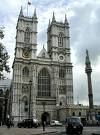
1395 In Feb. the Twelve Conclusions of the Lollards is nailed to the doors of Westminster Abbey and St. Paul's Cathedral, and presented to Parliament by the Lollards (Dutch "lollaerd" = singer of psalms) (loller = lazy fellow), criticizing the wealth of the clergy, disputing the real presence of Christ's body and blood in the Eucharist, dissing the worship of images of Christ suffering on the cross, and calling for a form of separation of Church and State, calling for a universal non-celibate priesthood sans confessions to priests and their feigned forgiveness of sins; "If the cross of Christ, the nails, spear, and crown of thorns be honored, then why not honor Judas' lips, if only they could be found?" On Apr. 14 Tamerlane defeats his arch-rival Tokhtamysh at the Battle of the Terek River in N Caucasus, then sacks his capital of Sarai Berke and places a puppet on the throne, ending central control of the Mongol Golden Horde; Tokhtamysh escapes to the Ukrainian steppes and requests aid from Lithuanian grand duke Wytowt (Vytautas). In Apr. Sardinian judge (since 1383) Eleanor de Bas-Serra (Arborea) (Arbaree) (1347-1404) gets the Carta de Logu passed, a civil-penal law code for Sardinia substituting fines for imprisonment for most crimes, preserving the property rights of women, and granting legal protection to falcons, which is not superseded until Apr. 1827 by the code of Charles Felix. On May 17 the Battle of Rovine near the Arges River (Craiova?) in Wallachia sees the heavily-outnumbered Wallachians led by Mircea the Elder defeat the Ottomans led by Sultan Bayezid I after the Wallachian archers decimate their intial wave; both sides suffer heavy losses; Serbian Prince Marko Mrnjavcevic (b. 1335) vassal of the sultan is KIA. On June 3 Bulgarian tsar (since 1371) Ivan Shishman (b. 1350) is beheaded in Nikopol by Sultan Bayezid I, and his territory is annexed by the Ottomans; Bulgarian emperors continue to rule in Vidin until 1422. The Ottomans occupy the Dobruja (between the Black Sea and Danube River), and invade Wallachia and Hungary. Richard II secures a propaganda V when four Irish kings swear fealty and accept knighthood from him, the royal houses of O'Neill, O'Connor, O'Brien, and Macmurrough. Gian Galeazzo Visconti (1351-1402) is made the first hereditary duke of Milan by Wenceslaus IV, becoming the first such title among Italian regional rulers; asking himself "Why stop there?", he plots to unite N Italy into a revived Lombard empire with him driving the boat. Jelena Gruba becomes the first and only female ruler of Bosnia (until 1398). Architecture: Gonzaga Fortress in Mantua, Italy is begun (finished 1406). The rebldg. of Westminster Hall in London, England is begun (finished 1399), featuring a hammer-beam roof. Nonfiction: Pero Lopez de Ayala (1332-1407), History of the Kings of Castile (vol. 1); written in prison; the complete work is printed in 1779-80. Births: Lithuanian Hussite duke Sigismund Korybut (d. 1435) in Novgorod-Seversky; nephew of Wladyslaw II Jagiello (1362-1434) and Wotila (1350-1430). Burmese Hanthawaddy king #11 (1424-46) Binnya Ran I (d. 1446); brother of Binnya Dhammaraza (1392-1424). Italian painter Pisanello (Antonio di Puccio Pisano (da Cereto)) (d. 1455) in Pisa. French merchant Jacques Coeur (d. 1456) in Bourges. Greek Orthodox-Roman Catholic scholar Cardinal Johannes (John) (Basilius) Bessarion (d. 1472) in Trebizond; pupil of Gemistus Pletho (1355-1452); attempts to reconcile Plato and Aristotle and reunite the Greek and Roman churches. Deaths: French chef Taillevent (b. 1310); leaves Le Viandier, the first French cookbook, founding French cuisine incl. its love of strong red wines from S France and Burgundy. Scottish "The Brus" poet John Barbour (b. 1316) on Mar. 13 in Aberdeen. Italian painter Altichiero da Zevio (b. 1330). Serbian king (1371-95) Prince Marko (b. 1335) on May 17 in Rovine, Wallachia (KIA). Austrian duke Albert III the Pigtail (b. 1349) on Aug. 29 in Schloss Laxenburg. Hungarian queen (1382-95) Mary (b. 1371) on May 17 in Buda.


1396 In Jan. 14-y.-o. Erik of Pomerania is declared of age, and becomes king of Denmark; in July he becomes king of Sweden; Margreta (Margaret), Queen (since 1387) of Denmark maintains the real power (until 1412), working to recover the Danish royal domain while keeping the nobles down, and working Danes and Germans into positions of power in Sweden and Norway - that guy's surfing in snow and ice? On May 19 John I the Hunter of Aragon (b. 1350) dies without an heir after a fall from a horse, leaving his kingdom bankrupt, and his younger brother Martin I (the Elder) (the Humane) (the Ecclesiastic) (1356-1410) becomes king of Aragon (until 1410), becoming the last ruler of the House of Barcelona founded in 870 by Wilfred the Hairy, and continuing the support the Avignon popes; he sends his son King Martin the Young of Sicily to reconquer Sardinia from pesky Eleanor of Arborea. On Sept. 25 lord chancellor (since 1391) Thomas Arundel (1353-1414) is appoined by Richard II as archbishop of Canterbury. On Sept. 25 after king Sigismund I of Hungary leads an army of 20K Crusaders drawn from many European countries (incl. a bunch of French knights) against the Turkish Ottomans under Sultan Beyazid (Bajazet) I along the Danube, they are crushingly defeated at the Battle of Nicopolis (Nicopol) (Nikopol) after an initial V causes them to recklessly pursue the survivors, only to run into a fresh corps of Turkish sipahis being kept in reserve, followed by another Serbian army, causing a rout, with thousands of Crusaders KIA incl. nearly all of the knights in command, with the leading nobles taken POW incl. Enguerrand (Ingelram) VII de Coucy, 1st Earl of Bedford (1340-97), who are forced to watch a day-long mass beheading of up to 3K soldiers, after which they are marched naked 350km to Gallipoli then shipped to Turkey and held for ransom, only to run into an epidemic of the bubonic plague; the big V consolidates Ottoman hold of the Balkans and Bulgaria; Duke Philip the Bold's son John (b. 1371) is taken POW for a year until he is ransomed with an enormous boodle, earning the nickname Fearless for his bravery. On Sept. 28 Robert III of Scotland officiates at a clan combat to the death in Perth between the Kay and Chattan clans. To stave off a Portuguese invasion, Henry III of Castile stages a surprise attack on Badajoz on the Guadiana River on the Spanish-Portuguese border. The Muslim Rajput Dynasty is founded in Gujarat, W India (until 1572). Richard II of England dumps Anne of Bohemia, and marries his 2nd wife, 7-y.-o. French princess Isabella (Isabelle) of France (1389-1409) (daughter of Charles VI and Isabelle of Bavaria) in Calais, and secures a 20-year truce with France, which is unpopular but helps his finances; England is left with a strip of the Gascony coast from Bordeaux to Bayonne, plus Calais, which is much less than they controlled at the war's start in 1337. The red zone rule: never go behind, always go in front? John of Gaunt (b. 1340) marries his mistress Catherine Swynford (1350-1403) (his 3rd wife); his four children by her under the name of Beaufort are declared legitimate by Parliament in 1397, and begin successfully struggling for the English throne. Learned Czech dingaling John Huss delivers a series of lectures at the U. of Prague based upon the doctrines of John Wycliffe - you know I'm such a fool for you, you got me wrapped around your finger, do you have to let it linger? Births: Italian clergyman-writer Antonio Bettini (d. 1487) on June 13 in Siena. French Valois duke of Burgundy (1419-67) Philip III the Good (Philippe le Bon) (d. 1467) on July 31 in Dijon; son of John the Fearless (1371-1419) and Margaret of Bavaria (1363-1423); grandson of Philip the Bold (1342-1404); father of Charles the Bold (1433-77). English military cmdr.-statesman (foyal councilor of Henry VI) William de la Pole, 1st Duke of Suffolk, 1st Marquess of Suffolk, 4th Earl of Suffolk (AKA Jack Napes) (d. 1450); 2nd son of Michael de la Pole, 2nd earl of Suffolk (1367-1415); created marquess in 1444, earl in 1447, and duke in 1448; derisively nicknamed "jackanapes" because after rising from the merchant class to become a nouveau riche noble, he adopted a coat of arms featuring a collar and chain, associated with monkeys. Spanish king of Aragon, Valencia, Majorca, Sardinia, and Corsica (1416-58), count of Barcelona (1416-58), and king of Naples (1442-58) Alfonso V (the Magnanimous) of Aragon (Alfonso I of Naples) (d. 1458); son of Ferdinand I (1380-1416) and Eleanor of Albuquerque (1374-1435); brother of John II (1397-1479); father is from the House of Trastamara, mother from the the House of Barcelona. Czech Hussite Ultraquist theologian John of Rokycany (Jan Rokycana) (d. 1471) in Rokycany, Bohemia; educated at the U. of Prague. Deaths: German theologian Marsilius of Inghen (b. 1330). Spanish king of Aragon (1387-96) John I the Hunter (b. 1350) on May 19 near Foixa (fall from a horse); same fate as his cousin John I of Castile (1358-90). English mystic Walter Hylton (b. ?); leaves Ladder of Perfection. English Augustinian monk-historian Henry Knighton (Knyghton) (b. ?) in the St. Mary of the Meadows Abbey in Leicester; leaves Knighton's Chronicle (Chronicon) (5 vols.); English history from 959-1366; vol. 5 covers 1377-95; first pub. in 1652.

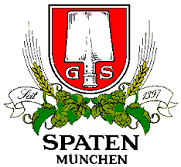
1397 Norway's 400-Year Night begins (ends 1814). Haxey escapes the axey, but Arundel doesn't fare as well? In Jan. Richard II is criticized by a parliamentary petition for the exorbitant expenses of his household, causing him to throw a hissy fit and get the petition's author Thomas Haxey tried and convicted of treason, but not executed; after Richard II packs both houses and calls a parliament, the counter-coup of 1397 see them strike back against the Lords Appellant, accusing them of treason for their acts back in 1388, the whole case establishing the right to free speech in Parliament; on Sept. 17 after tricking Archbishop Thomas Arundel into tricking his brother out of hiding under a false promise of royal safe conduct, they imprison Richard RitzAlan, 4th (11th?) Earl of Arundel, 9th Earl of Surrey (b. 1346) (arrested on July 12 and beheaded on Sept. 21, along with Thomas de Beauchamp, 12th Earl of Warwick (1338-1401) (imprisoned for life on the Isle of Man with his heirs disinherited in perpetuity), and Thomas of Woodstock, 1st Duke of Gloucester (b. 1355) (murdered on Sept. 8/9 in prison in Calais by Thomas de Mowbray, 1st Duke of Norfolk and Sir Nicholas Colfox on Richard's orders, turning the nobles more against him), and exile John of Gaunt's son (Richard II's cousin) Henry Bolingbroke, Duke of Hereford (1367-1413) (future Henry IV); Gloucester is murdered in prison under mysterious circumstances before he can be tried, and later becomes the subject of a disputed play by Shakespeare; on Sept. 21 the earl of Arundel is executed. On Feb. 2 brain man Manuel Chrysoloras (1350-1415) arrives in Florence to teach ancient Greek lit., launching the Greek revival in Italy before leaving in Mar. 1400, with students incl. Leonardo Bruni (1370-1444), Poggio Bracciolini (1380-1459), Niccolo Niccoli (1364-1437), Pier Paulo Vergerio the Elder (1370-1444), and Roberto Rossi (1355-1417) (teacher of Cosimo de Medici). On June 17 the ruling Council of the North meeting in Kalmar (Calmar) approves the Kalmar (Calmar) Union, crowning Queen Margreta's grandnephew Erik of Pomerania as king of Sweden, Denmark and Norway (incl. Iceland); the three countries are united under one king, but have separate laws, and Margaret's vague plan for permanent union is never ratified. On Sept. 29 Thomas Percy (1344-1403), young brother of Henry Percy is created Earl of Worcester by Richard II, reviving a title that has been extinct since 1145. The Ottomans occupy Karaman. The siege of Constantinople by the Ottomans is abandoned after a distraction caused by Tamerlane, but the blockade continues until 1402. The Ottomans abolish the Bulgarian Orthodox Church, subordinating it to the partriachate of Constantinople (until 1870), causing Bulgarian patriarch (since 1375) St. Euthymius of Tarnovo (1325-1404) (who unsuccessfully defended Veliko Tarnovo) to flee to Bachkovo Monastery on the Chepelare River 6 mi. S of Asenovgrad (founded 1083); after his death the Turks destroy the monastery except for the ossuary. Spaten Brewery (Spade or Malt Shovel Brewery) in Munich, Bavaria, Germany is first mentioned as making Weiser Prew; in 1841 it introduces Marzenbier (Märzenbier), brewed in icy Mar., becoming a favorite for Oktoberfest, becoming the largest brewery in Munich in 1867; in 1894 it introduces Munchner (Münchner) Hell (Pale) lager, developed since 1872 by Gabriel Sedlmayer Jr. and his brother Josef Sedlmayer, who adopted pale ale techniques to create pale lager, beginning exports to North Am. in 1909; in 1922 it merges with Franziskaner-Leist-Brau; in 1924 it launches the ad slogan "Let yourself be advised, drink Spaten"; in 1997 it merges with Lowenbrau; in 2003 it is acquired by Interbrew; in 2010 it produces 2M barrels. Births: Franco-Flemish priest composer (founder of the Burgundian School of Music) Guillaume Dufay (Du Fay) (d. 1474) on Aug. 5 in Chimay, Hainault; master of counterpoint, esp. 4-part. Austrian duke (1404-39), Bohemian king (1438-9), Hungarian-Croatian king (1437-9), and German king and uncrowned HRE (1438-9) Albert (Albrecht) II (the Magnanimous) of Hapsburg (Duke Albert V of Austria) (d. 1439) on Aug. 10 in Vienna; son of Albert IV (1377-1404) and Beatrix of Nuremberg; descendant of Bela IV of Hungary; founder of the Imperial Hapsburg Dynasty. Korean king Sejong (Yi Won-chong) (d. 1450). Italian Renaissance painter Francesco Squarcione (d. 1468) in Padua; teacher of Andrea Mantegna. Aztec emperor (1440-69) Montezuma (Moctezuma) I (d. 1469). Italian Florentine painter Paolo Uccello (Paolo di Dono) (d. 1475) in Florence; big stickler on proper perspective. Italian mapmaker Paolo Toscanelli (d. 1482). Deaths: German philosopher Henry of Hesse (b. 1325) on Feb. 11 in Vienna. Italian composer-organist Francesco Landini (b. 1325) on Sept. 2 in Florence. English nobleman Enguerrand VII de Coucy (b. 1340) in Feb. 18 in Bursa, Anatolia (Turkey). English noble Richard, earl of Arundel on Sept. 21 (executed).
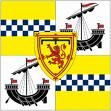

1398 On Apr. 28 Robert III of Scotland gives his son and heir David Stewart, earl of Carrick the honorary title of Duke of Rothesay (the Stewart ancestral home on the Isle of Bute) to signify the heir apparent of Scotland, and his brother Robert, earl of Fife the honorary title of Duke of Albany (Gaelic for Scotland) preparatory to beginning a summer campaign against Donald MacDonald, lord of the Isles; meanwhile after his brother Robert dies, Walter de Danielston (Danyelston) (-1402) takes over Dumbarton Castle, and keeps it despite a long siege by the king's men, and fresh prince David shows off at a tournament organized by Queen Annabella in Edinburgh. On June 24 emperor (since 1368) Ming Tai Tzu (b. 1328) dies, leaving 24 sons, all princes; too bad, inept son Jianwen becomes Ming emperor #2 Ming Hui Di (-1403) (until 1403). Timur the Lame isn't timid about dining in Delhi, becoming the original Soup Nazi? On Sept. 24 after invading unresisting anarchic India, bad-to-the-bone Tamerlane crosses the Indus River, marches 80 mi. a day for two days (Nov. 6-7) to overtake fugitives at Bhatnair, massacres 100K Hindu POWs (like cows?) before Delhi on Dec. 12 for smiling when an Indian army appears in sight, then on Dec. 17 sacks Delhi and kills Dehli sultan Mahmud Tughlak, destroying the 2-cent.-old Delhi Sultanate (begun 1192); in his own words: "In a short space of time all the people in the Delhi fort were put to the sword, and in the course of one hours the heads of 10,000 infidels were cut off, the sword of Islam was washed in the blood of the infidels, and all the goods and effects, the treasure and the grain which for many a long year had been stored in the fort became the spoil of my soldiers... Their women and children and their property and goods became the spoil of the victors. I proclaimed throughout the camp that every man who had infidel prisoners should put them to death, and whoever neglected to do so should himself be executed and his property given to the informer. When this order became known to the ghazis of Islam, they drew their swords and put their prisoners to death. One hundred thousand infidels, impious idolaters, were on that day slain. Maulana Nasiruddin Umar, a counselor and man of learning, who in all his life had never killed a sparrow, now, in execution of my order, slew with his sword fifteen idolatrous Hindus, who were his captives.... On the great day of battle these 100,000 prisoners could not be left with the baggage, and that it would be entirely opposed to the rules of war to set these idolaters and enemies of Islam at liberty... No other course remained but that of making them all food for the sword"; Tamerlane then pulls out of India, leaving Mahmud's son Big Mac, er, Mahmud Tughlak II (d. 1414) as chief undertaker of a ghost Delhi, which takes a cent. to recover; after they realize that there are too many to slaughter, the Muslim clergy devise the fiction that Hindus are People of the Book? On Oct. 14 Jeongjong (Yi Bang-gwa) (1357-1419), 2nd son of Taejo becomes king #2 of the Joseon (Chosun) Dynasty (until Nov. 28, 1400). The English Parliament votes Richard II a revenue for life and delegates its most important powers to a small committee packed by him, thus freeing him from control by Parliament and barons alike and allowing him to become an arbitrary despot, making such an ass of himself that he soon foments revolt?; on cue, on July 20 Roger Mortimer, 4th earl of March (b. 1374) (heir presumptive to his cousin Richard II) dies, and is succeeded by his 7-y.-o. son Edmund de Mortimer, 5th Earl of March, 3rd Earl of Ulster (1391-1425), who becomes heir presumptive to the childless Richard II, with a better hereditary title (through Lionel, duke of Clarence, 3rd son of Edward III) than Henry IV; after Henry IV's accession, Edmund sits in the court of Scotland plotting his overthrow with any and all English factions fed up with him? Wenceslaus IV and Charles VI of France agree that the rival popes should both resign and a new one be elected. John VII Palaeologus (1360-1412) becomes co-regent with his uncle Manuel II. Martin I of Aragon crusades against the Moors of N Africa (until 1399). The Turks begin the first of a long series of attacks on Bosnia. The Ottomans occupy and annex Kadi Burhaneddin's principality of Eretna in Sivas (NE Anatolia). Janus of Cyprus (1375-1432) becomes king of Jerusalem (until 1432). T'aejo II dies, and Chongjong III (-1400) becomes Yi king of Korea; a puppet of the Chinese? Henry I Sinclair (St. Clair), Earl of Orkney, Baron of Roslin, and Lord of Shetland (1345-1401) (builder of Roslin Castle in Midlothian, near which Rosslyn Chapel is later built by his grandson William) sails W and explores Greenland, then discovers Nova Scotia, whose coastline looks a lot like the Highlands of guess what?; he actually dies in battle against the English? Jan Hus lectures on theology at Prague U. The Confrerie de la Passion begins performing religious plays in Paris (ends 1551). Nicolas Flamel (1330-1418) succeeds Blanche d'Evreux as grandmaster of the Priory of Sion (until 1418), becoming the first not in a blood relationship with the preceding :). Inventions: Paper sizes are standardized for the first time in Bologna, Italy - how far can we be from toilet paper? Nonfiction: Don Pero Lopez de Ayala (1332-1407), Book on Hunting with Birds of Prey; written in prison. Poetry: Don Pero Lopez de Ayala (1332-1407), Rimado de Palacio (Rhymes of the Court); one of the earliest references to chivalric tales of Amadis and Lancelot. Births: Spanish king of Aragon (1458-79) and Navarre (1425-79) Juan (John) II (the Great) (the Faithless) (d. 1479) on June 29 in Medina del Campo; son of Ferdinand I of Aragon (1380-1416) and Eleanor of Albuquerque (1374-1435); brother of Alfonso V of Aragon (1396-1458); husband (1420-41) of Blanche I of Navarre (1387-1441), and (1444-58) Juana Enriquez de Cordoba (1425-68); father of Ferdinand II the Catholic (1452-1516); father-in-law of Isabella I the Catholic of Castile (1451-1504). Italian Renaissance humanist scholar Francesco Filelfo (d. 1481) on July 25 in Tolentino, Ancona. Spanish (Castilian) humanistic poet Inigo Lopez (Íñigo López) de Mendoza y de la Vega, Marquis de Santillana (d. 1458) on Aug. 19 in Carrion de los Condes; son of adm. Diego de Mendoza and Dona Leonor de la Vega. Indian mystic poet and religious leader (St.) Kabir Das (d. 1448); leader of the Bhakti movement in N India; raised by Muslim weavers Niru and Nimma. German Man of the Millennium (mechanical printing press inventor) Johannes Gutenberg (Johannes Gensfleisch zur Laden zum Gutenberg) (d. 1468) in Mainz - nerds and geeks have their first Bill Gatesenberg? Spanish (Castilian) poet Alfonso Martinez de Toledo (d. 1470) in Toledo; archpriest of Talavera. Italian Florentine banker Luca Pitti (d. 1472). English lord chancellor (1456-60) and bishop of Winchester (1447-86) William Waynflete (Patten) (d. 1486) in Wainfleet, Lincolnshire; educated at Winchester College, and New College, Oxford U.?; founder of Magdalen College, Oxford. Deaths: Greek Byzantine statesman Demetrius Cydones (b. 1324). Chinese Ming emperor (1368-98) Ming Tai Tzu (b. 1328) on June 24; leaves 24 sons, all princes. English heir presumptive (to Richard II) Roger de Mortimer, 4th earl of March (b. 1374) on July 20 in County Carlow (County Meath?), Ireland; KIA while riding unattended wearing Irish garb.


1399 You thought this song wasn't about you? Everybody alive in the year 2000 C.E. had 1M ancestors alive this year? - I told you I'd show you where you, me, everybody came from, haha? On Jan. 9 Tamerlane storms Meerut, then fights his way back along the Himalayas to the Indus River by Mar. 19, and returns to Samarkand with loads of loot and builds a great mosque to thank Allah; at the end of the year he sets out for Egypt on his last great conquest. In Jan. using his father's infirmity as a pretext, Prince David Stewart, duke of Rothesay gets a council in Perth to name him lt. of Scotland for three years, reporting to a council of 21 nobles led by his uncle Duke Robert of Albany, and Archibald, 3rd earl of Douglas. On Feb. 4 Edward III's son Old John of Gaunt, duke of Lancaster (b. 1349) dies, "ever a threat to England"; in Mar. the inheritance of his exiled son Henry Bolingbroke of Lancaster is confiscated by Richard II for his Irish war, causing grumbling among his nobles, and Henry to raise an army ("You pluck a thousand dangers on your head/ You lose a thousand well-disposed hearts" - Shakespeare, Richard II, 2.1.205-6); in June Duke Louis I of Orleans gains control of insane Charles VI, causing it to be covenient to allow Henry to leave, and after Richard II invades Ireland for a 2nd time in June to quell a revolt, giving Henry his chance, in July he lands at Ravenspur, after which Richard II returns from Ireland in Aug. to find Henry supported by Harry Hotspur and regent Edmund of Langley, duke of York (brother of John of Gaunt); on Aug. 19 Richard II (king since 1377) is captured and forced to abdicate on Sept. 29 ("For I must nothing be" - Shakespeare, Richard II, 4.1.201), then thrown into the Tower of London; Parliament asserts its ancient right of election to get around his faulty hereditary claim, and on Oct. 13 Bolingbroke (is bowling that expensive?) is crowned Henry IV (1367-1413) (England's 33rd monarch) (until Mar. 20, 1413), founding the red rose Lancastrian Dynasty (ends 1461) (descended from Edward III's 3rd son John of Gaunt), briefly adopting an eerily U.S. politician's style and promising "to be advised and governed by the honourable, wise and discreet people of his realm, and to do what is best for the government of himself and of the realm by their common counsel and assent; he does not desire to be govered by his own will, nor by his arbitrary purpose or singular opinion, but by common advice, counsel and assent"; the English Parliament is opened with a speech in English for the first time; Bay trees throughout England wither then grow green again?; Henry's rival Edmund de Mortimer, 5th earl of March is imprisoned, although allowed to inherit his vast estates; the French king (father of Richard II's wife) refuses to acknowledge Henry, and nullifies their long truce; exiled archbishop of Canterbury Thomas Arundel returns, and works with never-merry ultra-orthodox Henry IV to suppress the Lollards and burn heretics at the stake for the first time in English history, bringing the Dark Ages back, causing Lollard supporters incl. Geoffrey Chaucer to lie low?; meanwhile under Henry IV the misery in Ireland starts to peak, and eventually half of the English colony ends up returning home. In late May Richard II makes his 2nd (last) invasion of Ireland, landing on June 1 in Waterford with only 3K troops, but a retinue of three dukes, three earls, and all five captains of the king's bodyguard; too bad, his results are muddled, and after receiving news of the landing of Henry of Lancaster in July, he scraps plans to have his nephew Thomas Holland crowned as king of Ireland in Dublin on Oct. 13, and returns to take him on; as soon as he departs, war breaks out, and his viceroy is murdered; the Battle of Tragh-Bhaile in Dundalk is a V for the Anglo-Irish over the O'Neills led by Domhall mac Enri of Tyrone, who is captured and sent to England. On Aug. 12 the combined armies of Lithuanian grand duke Witowt (Vytautas) and Mongol Khan Tokhtamysh are defeated by Tamerlane's army under gens. Temur Qutlugh and Edigu at the super-bloody Battle of the Vorskla River near the Dnieper River, after which Tokhtamysh makes a run for it, and is chased down and KIA Edigu's troops in Siberia in 1406. In Dec. the Epiphany Rising against Henry IV by supporters of Richard II in an attempt to put him back on the throne begins, fizzling out by early Jan., sealing Richard II's fate along with that of his top supporters. Byzantine Emperor Manuel II goes on a 4-year tour of Europe, seeking help against the Turks, becoming the first Roman emperor since Constans in 343 to visit England; he appoints former usurper John VII regent in his absence. The Ottomans occupy Elbistan and Malatya W of the Euphrates River, giving them control of most of Anatolia. Duke Gian Galeazzo Visconti of Milan purchases Pisa, and seizes Siena - purchases the pizza and steals the seasoning? French king (since 1380) Charles VI the Well-Beloved (1368-1422) lapses into madness 6x this year, always during a new or full moon, causing the Well-Beloved part to be replaced by the Mad - a true lunatic? Richard II of allows two Venetian galleys moored in London to sell glassware - as long as they don't have booty acne? Poetry: Anon., Richard the Redeless (Richard, Devoid of Counsel); Richard II was really just suffering from poor advisers? Births: Dutch painter Rogier van der Weyden (Rogelet de le Pasture) (Roger of the Pasture) (d. 1464) (b. 1400?) in Tournai. Ethiopian emperor (1434-68) Zara Yaqob (d. 1468) (Amharic "seed of Jacob") in Tilq, Fatagar (near the Awash River); youngest son of Dawit I. Italian Renaissance sculptor Luca della Robbia (d. 1482) (b. 1400?) in Florence; uncle of Andrea della Robbia (1435-1525); known for glazed terra cottas. Deaths: French duke of Brittany (1345-99) John V the Conqueror (b. 1339) on Nov. 1. English kingmaker John of Gaunt (b. 1340) on Feb. 4. Polish queen Jadwiga (b. 1374) on July 17. Mamluk sultan #1 (1382-9, 1390-9) Barkuk (Al-Malik az-Zahir Sayf ad-Din Barquq (Arab. "plum") (b. ?).